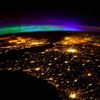15.8.2007 | 13:31
Essay on environmental ethics and theology
I´m now foraying into the realm of environmental ethics. As an environmentalist I need a sound base to stand on and also as a Christian I need to learn how to behave and think with regard to the natural world. Here the concept of stewardship is all embracing. Man instead of dominating nature should seek to become a member of God´s created community and he should seek to find kinship with all living things on Earth. I sometimes wonder if it were to happen that mankind would find a common midge on Mars, whether we would not be wildly exited even though we tend to despise midges, useful as they may be, in our own natural world. Even the coarsest midge or the commonest loon is a part of our environment, a part of our heritage and our companionship here on Earth. If we also extend this companionship to the non-living Earth, to the soil, to the rocks realizing fundamentally that there is a thread of cause and effect between the nature of the soil and what life thrives in it we have reached an even deeper understanding of the complex interconnectedness of our natural world. For the nature of the soil minerals, the acidity and chemistry of the soil, ultimately is decisive for what plants thrive in it, and which animals live on it. We must not forget that the division between geology and biology is a fictional one that nature in her magnificence does not obey. Fundamentally the soil is the ground on which we stand, literally. We have no other soil or ground to stand on. Humanity cannot "create"soil in laboratories. Will it ever happen that we will be forced to import soil from other planets because we have destroyed the soil cover of the Earth ?
I wish that our feeling of companionship would reach further both towards our neighbour and towards the natural world. In a desolate world a lonely midge becomes a miracle. And life is truly a miracle edging out a precarious existence on this somewhat lonely pale blue dot in space. I use Carl Sagan´s expression here, because astronomy has truly shown us how huge the cosmos is and how small and tiny the human condition is. Mankind is indeed of little signifigance in comparison with God´s whole creation, and we´re not even sitting in the middle of the universe, far from it, we are situated in one arm of a spiral galaxy which is part of a galactic cluster which in turn rotates around an unknown center in the supergalactic cluster. And our Sun, worshipped as it was by the Egyptians, is only an ordinary Sun of the G2 type. Middle aged it´s half way through burning it´s fuel. So here we are, small as midgets in the lonely inhuman wasteness of space with a Sun that´s slowly burning out, and we pretend that we do not need God, - that we can do everything without him. We are truly like 3 year old children that want to do everything themselves.
So like Tillich, we have to start from the human condition. From an environmental and natural science perspective it has to be admitted that the human condition is rather bleak. Humanity is arduously eroding the foundations of life itself on this planet, including human life. Technology and scientific knowledge, as opposed to scientific wisdom, play a large part in this development putting atomic weapons in the hands of morally blind people who act as children without light. So the human condition is that of constant peril, posed as it is on the brink of the blackness of space, and mankind also feels a deep sense of abandonment since many men can neither see the miracle of God nor experience his presence. Some pessimists say that God created the world and then left it to evolve on it´s own premises. But what does the Christian message say? The Christian message unlike that of scientific knowledge and technology, is that of Hope. As Tillich so amptly emphasizes, man has to affirm himself against the blackness of the void, through the voluntary act of faith. Faith thus becomes the affirmation of being. And faith is expressed mainly through man´s relation to God, which is the loving being ever present in the world and whose love should be our ultimate concern. The world is God´s expression of himself, his word in fact, and God is thus constantly present in the world never to abandon mankind even though mankind may often feel abandoned. Indeed the creative process that created the world is still at work and thus the world is constantly being created. God´s work is not finished and we are called from our bleak condition, to become the co-workers of God, helping him to realize a future world of love, justice and hope. It lies in our hands to affirm our existence through faith and thus to aquire the hope which knows that behind all appearances there is a loving God, that seeks to heal the wounds and administer both wisdom and in the end benevolent and loving justice.









Athugasemdir
Takk fyrir þessa flottu grein...
ps;
Er Guð þá ekki að hugsa um hvort manneskjan sé samkynhneigð?
Anna Benkovic Mikaelsdóttir, 16.8.2007 kl. 14:12
Hæ Ingibjörg. Ertu til í að senda mér tölvupóst á aingolfs(hjá)simnet.is ? Mig vantar netfang hjá þér. Ég er bara með rannis netfangið þitt í adressubókinni minni.
Auður H Ingólfsdóttir (IP-tala skráð) 18.8.2007 kl. 15:52
Bæta við athugasemd [Innskráning]
Ekki er lengur hægt að skrifa athugasemdir við færsluna, þar sem tímamörk á athugasemdir eru liðin.